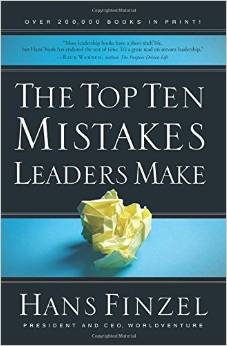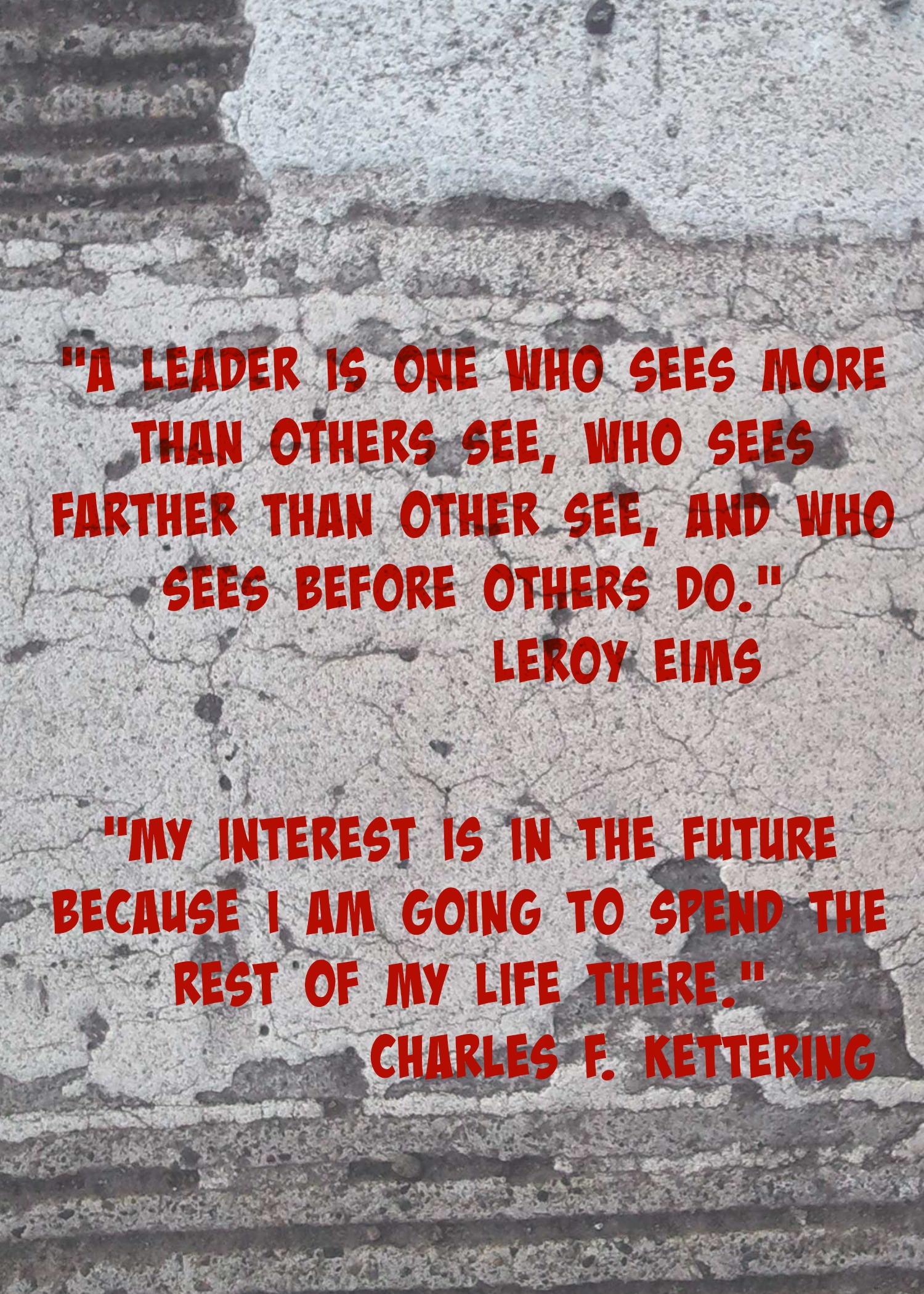Mistakes leaders make (10/10)
joeacast
I’m working my way through a book, The Top 10 Mistakes Leaders Make, by Hans Finzel, and I’m really enjoying the challenge. So for the next ten Saturdays I want to work through these ten mistakes, knowing that they apply to CEOs, ministry leaders, parents, teachers, coaches, pastors and just about anyone in any kind of leadership role. I promise to keep my summaries short(ish), and I would love to interact with your thoughts as we go along. These mistakes are listed in order of how they occur in the book, not necessarily how I would arrange them. Overboard Leadership requires an honest self-evaluation of each of these shortcomings (sins?) of leaders. Looking for missed posts, click here: Mistake #1, Mistake #2, Mistake #3, Mistake #4, Mistake #5, Mistake #6, Mistake #7, Mistake #8, Mistake #9
-----
Mistake #10: Failure to focus on the future
The future is coming whether you want it to, or not, and the question for leaders is this: are you going to embrace it?

Finzel starts this chapter by sharing a letter written in 1829, from Martin Van Buren -- then Governor of New York -- to President Jackson. In it, Martin warns the president of the dangers of neglecting the country’s canal system in preference of the “railroad” system (he puts “railroad” in quotes every time he mentions it in the letter) that was sweeping across the country. Listen to his concerns:
- "If canal boats are supplanted by ‘railroads,’ serious unemployment will result.”
- “Boat builders would suffer and towline, whip, and harness makers would be left destitute.”
- “Canal boats are absolutely essential to the defense of the United States.”
- “‘Railroad’ carriages are pulled at the enormous speed of 15mph, by ‘engines’ which, in addition to endangering life and limb of passengers, roar and snort their way though the countryside, setting fire to crops, scaring the livestock, and frightening women and children. The Almighty certainly never intended that people should travel at such breakneck speed.”
As Hans points out, VanBuren would not approved of flying at 37,000 feet, at a healthy 500mph! But the future of travel in this country was in the rail system, and “breakneck speeds” were going to be increased substantially in the years to follow. Good leaders work hard to see that future coming, to embrace the changes necessary to survive and thrive in that future, and to see it coming before others in the organization.
“I believe our past successes can be our greatest roadblocks to future accomplishments,” writes Finzel, because what worked yesterday, or last year or in your country/state/city/school/family/church may not work anywhere else! Gone are the days of employees or volunteers or students blindly following the leadership of their institution. More then ever, people want to have a significant say in the decisions that impact their lives. This shift in culture forces a shift in how we think about leadership, and how we think about the future of leadership.
Telecommuting, globalization of work and instant anywhere access has influenced everything from education to how street lights work, from how your kids entertain themselves to how your church members listen to Sunday’s sermon. Leaders who fail to focus their attention on how the future is coming into their sphere of influence, will fail as leaders. Good leaders know that the one constant in leadership, is change.
The problem is that most people, including those of us in leadership, resist change. Over my 20 years of work and ministry, and I can think of men and women who brought change to an organization, but then, years later, resisted change when it was coming from another source. I know leaders who talk about change and claim to make it often, yet, to any outsider coming in, their organizations, ministries and schools remain much as they were ten, twenty, thirty and even fifty years ago!
Not only do people resist change, they are generally critical of it, too. Few people wanted the car to replace the horse and buggy, or the lightbulb to replace good ol’ kerosene lamps. The entertainment industry thought VHS and DVD would put an end to theaters! Good leaders have to help their followers feel good about change, so that the family/ministry/business/organization can embrace the future.
So how does a good leader focus on the future? No man or woman knows for certain what is coming next, but we know that the future will always represent a change in how things will get done. We also know that not all change, is good change, and effective leaders learn to discern the difference. Here a few practical tips from Hans about embracing the future as a leader:
- Set aside time to think about the future. Many organizations are stuck in survival mode, or stuck trying hard to preserve things the way they have always been. I can think of several large ministries that were hosting these events in the late 80s and early 90s that would pack out football stadiums with people coming to learn, worship and be challenged. By the late 90s, those types of events were not selling out, but several ministries tried to maintain their system. While Traci and I were still living in Seattle, one such ministry had to actually cancel their event due to a colossal failure to sell tickets one year. The next year, they tried again in a much smaller venue and five years later, they were still trying to maintain their influence. From 65,000 people in attendance, to less than 600, this organization failed to change and they lost their voice. Setting aside time to think about the future is crucial for ongoing success in your work, in your marriage and family, in your church and ministry or in your own personal life. Good leaders make thinking about the future a regular part of their work.
- Develop a fresh vision statement. While the mission of your organization may not ever change, the practical application of that mission (the vision), should! Powerful vision statements are time appropriate, set high standards, clarify purpose and direction, inspire enthusiasm, are easily understood and ambitious, and reflect the current uniqueness of the organization.
- Get together and set strategic goals. Having flexible long and short-term goals, is essential for the success of your leadership. Take time to regularly articulate your goals, and the goals of those who report to you. Sit down as a family and make goals and lay out your dreams, and as you do, you’ll see how they must embrace change in order to be fulfilled. Remember, SMART goals are the way to go! (Specific. Measurable. Attainable. Relevant. Trackable.)
- Concentrate and eliminate. Focus in on what you’re good at, not on what is a good opportunity. Not all good opportunities are meant for you or your organization, instead, through honest assessment and evaluation, try to work from your strengths. Concentrate on what you do well, and eliminate the things that hinder your focus.
- Read. Read. Read. Leaders who keep the future in focus, are informed people. They don’t read when they have extra time, they make reading a regular part of their leadership diet. They read books, magazines, ezines and blogs, and they listen to podcasts and watch their favorite speakers online as part of their daily/weekly routine.
- Attempt and expect great things. Leadership is about embracing the future of change, and being willing to step out to see God do great things through our work. When you have carefully and prayerfully prepared for the future, it’s time to attempt something great for the Lord expecting something great to happen! 200 years ago, when William Carey left for India, despite strong criticism from so many people, he declared, “Expect great things, attempt great things.” Every missionary serving in a foreign country today, can thank William Carey (and men and women like him) who attempted great things with their lives.
Bad leaders talk about change but do nothing. Bad leaders fear the future, and reject anything new. Bad leaders embrace all change without discernment. Bad leaders believe their past success is a guarantee of their future success.
Overboard Leaders don’t ignore the future, or hide like it isn’t coming their way. Instead, they look for it, and while keeping their mission firm, allow their vision to fluidly engulf the future of change. Overboard Leaders don’t run from the future, but with prayer, skill and courage, they see it before others do and lead their organization through change and transition. Overboard Leaders love the future!
Go ahead and take the plunge, your leadership will be better on the water!